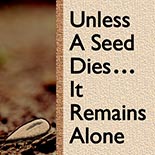Jesus speaks of death as a way of gaining life. It’s the mystery at the heart of the revelation of Jesus of Nazareth who we experience as God in his word, his death and his resurrection. But what does that really mean for us? If we are called to come to God, to come after Jesus, to follow in his footsteps, to be covered with the dust of his sandals in the way we live…then are we too called to death?
This episode begins with the background info that it’s the Passover, and that even the Greeks – or Gentiles – the non-Jews (those who worship the God of the Bible) – are present in Jerusalem for the principal feast and holy days of Judaism. They’ve come to retell the story of the deliverance of the Israelites from slavery in Egypt, bondage to the Pharaoh, as their own story. They approach Philip, who has a Greek name and comes from a Greek-speaking region. Don’t forget Greek was spoken as the main trade language in the world then, much like English is today. These “Greeks” don’t approach Jesus directly, out of fear of rejection?; out of respect?; or maybe because his Greek wasn’t so good? This is a climatic scene, for Jesus has just raised Lazarus from the dead (John 11:1-12:19) – a miracle that sets up Jesus as the resurrection and the life.
John depicts this story with an emphasis on the Gentiles coming to God (through Jesus). He calls it the coming of the final hour of Jesus, the death of Jesus, whose life could not be taken away from him involuntarily (John 10:17-18). The hour when Jesus will be lifted up in resurrection to give all people, drawn to him, life (John 12:32, 34).
It’s in all of this that Jesus jumps from talking about the glory of the Son of Man (verse 23) to the glorification of God’s name (verse 27). In between there is a teaching on death; another parable of a seed, different than the Sower (Mark 4:1-9), or the mustard seed (Mark 4:30-32), about barren and fruitful life. He talks of death as the means of gaining life (see John 12:32) To die is not to remain unproductive and barren, but rather Jesus is saying that the contrast is between the possibility of the grain rotting away into nothingness, or being productive, leading to new life.
Jesus often sets up contrasts in his teachings by talking about loving this and hating that….think of his comments about hating one’s mother and father, yet loving him (Matthew 10:37). It’s a contrast between earthly and heavenly things, between God-things and non-God things. John associates the non-God with the love of glory, the world and/or darkness.
And I digress. The teaching ends with Jesus steadfastly refusing to avoid his own death. That’s his priority, his purpose, his passion. If we’re to follow him, then is follows that it’s our too.
Questions for going deeper:
1. What word grabs your attention in today’s selections?
2. How do you struggle with death? Are you afraid of it?; ready for it?; welcoming of it?; uncomfortable with it?
3. Could it be that Jesus is calling us to death as a path to life? And if so what has that looked like for you?; for our church?
All the Biblical connections come from my reading of Raymond E. Brown’s Commentary on John.
